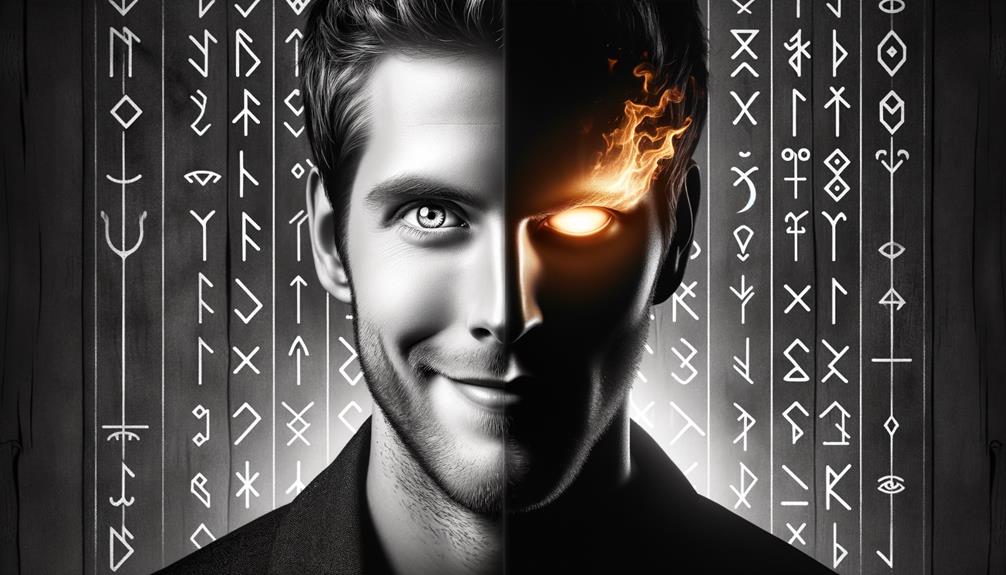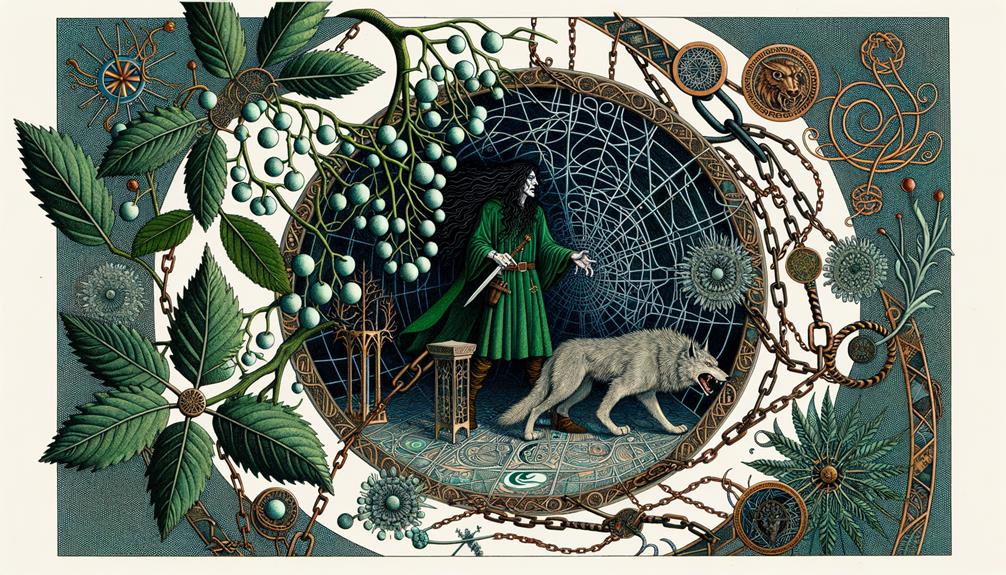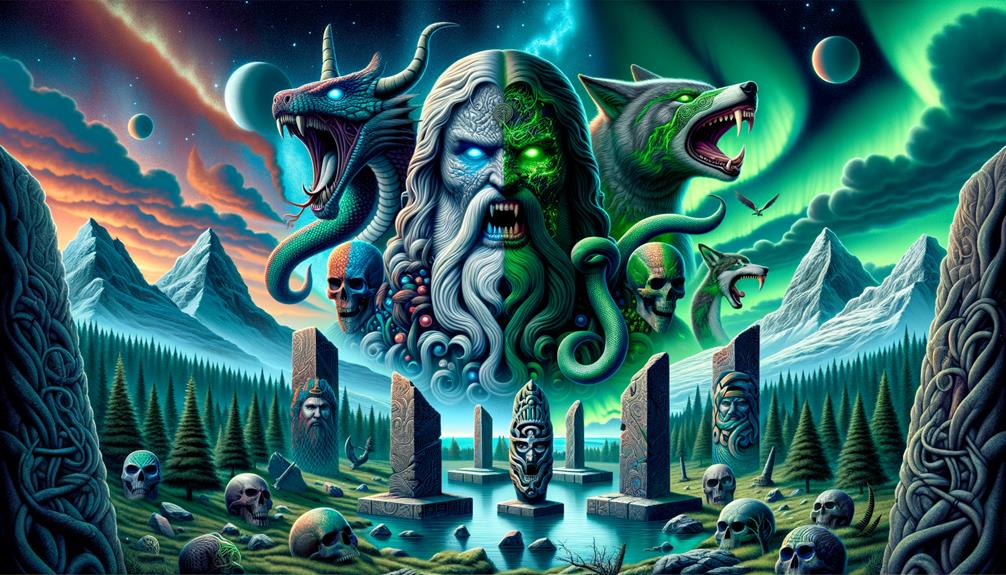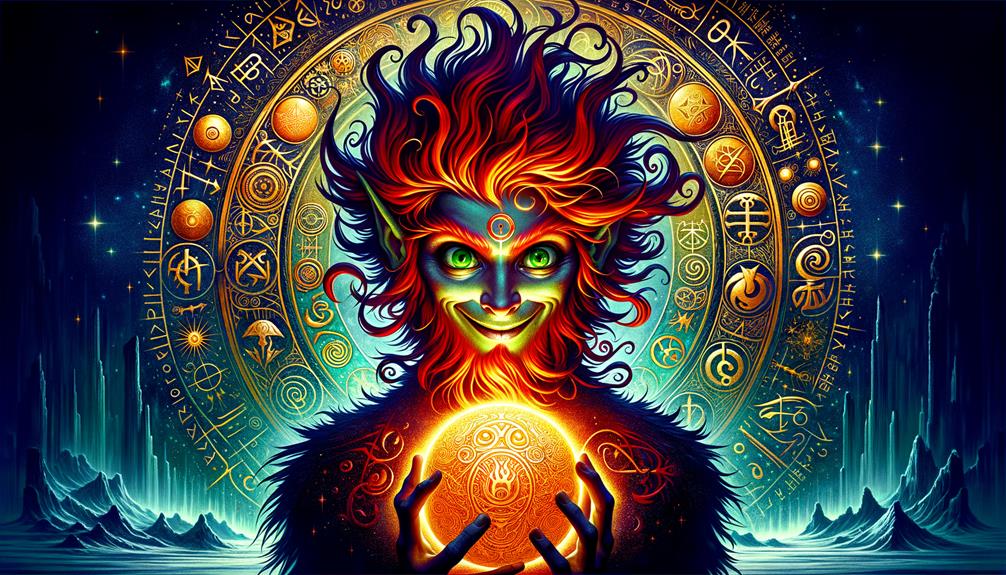Loki: The Mysterious Norse Mischief God
Unraveling the vibrant panorama of Norse mythology introduces us to the fascinating figure of Loki, the Norse Mischief God. This dynamic deity's identity is as mutable as his shape-shifting powers, his allegiances as unpredictable as his devotions. When contrasted with the consistent, expected traits of other Norse gods like Odin and Thor, Loki's capricious character becomes a captivating topic of exploration.
Loki: Villain or Catalyst?
Despite being frequently portrayed as a villain due to his deceptive deeds and the turmoil he triggers, Loki is not as straightforward as he appears. His involvement in a variety of myths reveals him as a pivotal figure who ignites events of monumental importance. From the forging of Thor's hammer to the initiation of Ragnarok – the apocalypse in Norse mythology – Loki's influence is undeniable. This prompts an intriguing query: Is Loki merely a playful prankster, or is there a more profound intent behind his antics?
Unveiling Loki's Complex Personality
To truly comprehend Loki's multifaceted persona, I suggest we dive deeper into the myths and legends that surround him. His role in these ancient stories extends far beyond random mischief. He is a key player, a catalyst, who sets the wheels of fate in motion. Whether it's his part in the creation of some of the most powerful artifacts in Norse mythology or his involvement in heralding Ragnarok, Loki's actions invariably lead to significant consequences.
Delving into the Enigma of the Norse Mischief God
So, is Loki simply up to mischief, or is there a hidden agenda beneath his actions? The answer lies in peeling back the layers of his rich, complex character and understanding his place in the grand scheme of Norse mythology. Join us as we embark on this journey, unveiling the enigma that is Loki, the Norse Mischief God.
Loki's Complex Identity

Unraveling the Complexity of Loki in Norse Mythology
In the intricate web of Norse mythology, Loki stands out as a puzzling character. He is a shape-shifter who doesn't just change his physical form but also challenges our understanding of his role. Loki is a capricious trickster god whose loyalties constantly oscillate between friend and foe. This Norse god is both a shrewd ally, assisting the other gods with his innovative plots, and a disruptor, regularly causing chaos among them.
Loki's Progeny: A Reflection of His Intricacy
The offspring of Loki further mirror his complex nature. Hel, the goddess of death, and Jörmungand, the notorious serpent, are deeply intertwined with chaos and destruction, reflecting Loki's diverse persona. Our comprehension of Loki's role in Norse mythology becomes more convoluted considering his ambiguous status in ancient Norse society. The lack of a devoted cult or his name in place-names adds to this mystery.
Despite being a close associate of renowned gods Odin and Thor, Loki's precise role remains elusive. This god of mischief, with his constantly morphing forms and unpredictable actions, enriches the Norse mythos, making him a mystifying figure in ancient Norse folklore. Hence, Loki's complexity transcends his shape-shifting powers and becomes an integral part of his identity.
The Enigma of Loki: A Crucial Factor in Norse Lore
Loki, the god of mischief, with his ever-changing persona and unanticipated actions, injects depth into the Norse mythos. His complex nature, which extends beyond his shape-shifting skills, becomes a key component of his identity. This makes Loki a fascinating and enigmatic character in ancient Norse lore. Through this, we see that the complexity of Loki goes beyond his abilities and becomes a crucial part of his identity.
The Dual Nature of Loki

Unveiling Loki's Dualistic Nature
Let's delve into the fascinating realm of Norse mythology to examine Loki's compelling duality, a characteristic that distinguishes him in the Norse godly realm.
- Loki: A Trickster and Ally
Loki, often viewed as a trickster deity, is also recognized for his strategic brilliance. He's the mastermind behind chaos in many myths, but simultaneously, he comes to the rescue of the gods with his sharp wit. This swing from malevolent intentions to beneficial actions underpins his two-sided nature.
- The Double-Edged Sword of Loki's Offspring
Loki's progeny – Hel, Jörmungand, and Fenrir, mirror his dual nature. They are the harbingers of death and destruction, echoing Loki's chaotic side. Yet, in some narratives, they personify justice and equilibrium, showing a different side to their father's persona.
- Loki and the Aesir: A Complex Relationship
Loki's interaction with other gods is multifaceted. He's part of the Aesir family, yet he's often seen as an outsider. This enigmatic god plays a dual role, being both a friend and an adversary to the gods, further emphasizing his dualistic nature.
In this exploration of Loki's intricate identity, we can see that his dual nature is a key aspect that sets him apart from the other Norse gods. This duality, seen through his own actions and those of his progeny, as well as his complex relationships with other deities, underscores Loki's uniqueness. As we navigate the rich tapestry of Norse mythology, Loki continues to captivate us with his contradictory and fascinating character.
Influential Myths Involving Loki

Unraveling the Intrigues of Loki: The Norse Trickster God
Loki, the Norse trickster god, is a captivating figure in the pantheon of Norse mythology, renowned for his wit and cunning. His intricate relationships with divine beings and his pivotal role in stirring chaos underscore the complexity of his character. Loki, the progeny of Laufey, often becomes the driving force behind significant mythological incidents.
Embark on an epic storytelling journey with Loki and Thor as they navigate the treacherous terrains of the giant's land. In this saga, Loki's shrewdness becomes their survival tool against the cunning giants. In another riveting tale, Loki's antics lead him to atone for his actions by retrieving the golden hair of Sif, which he had mischievously snipped off.
Loki's Progeny: Significant Figures in Norse Mythology
Loki's offspring, born from his shape-shifting adventures, are key figures in Norse mythology. Loki's brood includes Fenrir, the wolf, Jörmungand, the serpent, and Hel, the goddess of death.
| Loki's Offspring | Their Significance |
|---|---|
| Fenrir | Destined to battle Odin in Ragnarök |
| Jörmungand | Encircles the world, set to combat Thor |
| Hel | Reigns over the realm of the dead |
Loki: A Necessary Chaos in Norse Myths
Loki's deceptive abilities frequently land him in strife with the Norse gods. However, his existence is indispensable in the progression of their myths. His contributions, while often chaotic, are vital to the narrative.
In conclusion, Loki, with his guile and trickery, adds depth and intrigue to Norse mythology. His tales offer a blend of cunning strategies, memorable adventures, and complex relationships.
Loki in Norse Mythology: A Fascinating Blend of Chaos and Cunning
Loki's Infamous Family

Loki's Infamous Family: A Deeper Dive into Norse Mythology
Loki's fascinating adventures and mischievous deeds are quintessential aspects of his story, yet his notorious family, spawned from his alliances with the Jotunn giantess Angrboda and his spouse Sigyn, contribute significantly to the intricate tapestry of Norse mythology. Born to Fárbauti and Laufey and sibling to Býleistr and Helblindi, Loki's lineage serves as a cornerstone of his identity.
Loki's Monstrous Progeny: Offspring of Chaos and Destruction
Loki's union with Angrboda gave life to a trio of unforgettable offspring:
- Hel, a unique entity who, with one half dead and the other alive, reigns over the underworld.
- The world-engulfing serpent, Jörmungandr.
- The formidable wolf known as Fenrir.
These progenies personify chaos and ruin, leaving indelible marks on the Nordic universe.
Loki's Human Descendants: An Unexpected Contrast
With Sigyn, Loki sired two children, Narfi and presumably Baldrs, adding further branches to his diverse family tree. Unlike their monstrous half-siblings, these children showcase Loki's more human qualities.
As both the offspring of Laufey and the sibling to Byleist, Loki strategically navigates the tumultuous waters between the Aesir gods and the Jotunn giants. This delicate balancing act engenders intricate and often antagonistic relationships within the Norse mythological landscape.
Comprehending Loki's family dynamics enables us to untangle the multi-dimensional saga of Norse mythology, shedding light on the intertwined destinies of gods and giants.
By maintaining an active voice and using real-world examples, we can engage with Loki's story in a more meaningful way. Delving into Norse mythology can be a fascinating journey, and understanding Loki's family is an essential part of that adventure. You might consider reading 'The Prose Edda' by Snorri Sturluson for a more in-depth exploration of this enthralling topic.
Modern Interpretations of Loki

Exploring Modern Insights into Loki
Venturing into contemporary explorations, we encounter Loki, the Norse god of mischief, brilliantly redesigned as a multifaceted persona. This character intricately intertwines chaos, deceit, and a good-evil dichotomy. Loki, in his modern avatar, introduces a unique blend of disorder and guile, tinged with charisma, to mainstream culture. His role often oscillates between being a prankster and a rescuer in Norse mythology, creating turmoil, only to later resolve it.
Marvel Comics has significantly contributed to ingraining Loki's image into our collective minds. This comic giant has skillfully depicted Loki as the charming yet ethically doubtful offspring of the same name. His relationships are as convoluted as his personality. The thunder god, Thor, frequently finds himself at loggerheads with Loki, with events like Loki's Flyting underlining Loki's cunning and articulateness.
Loki distinguishes himself among the pantheon with his transformative abilities and gender fluidity, contributing an additional dimension to his already intricate persona. His tumultuous interaction with Thor's hammer Mjöllnir echoes Loki's dual nature of being both an originator and a disrupter. These contemporary interpretations of Loki have cemented his position as a mesmerizing and fascinating figure in modern mythology.
"Marvel Comics has significantly contributed to ingraining Loki's image into our collective minds."
Loki's complex nature and dynamic relationships in the Marvel Universe make him an intriguing character to explore. His ability to shape-shift and his gender fluidity add depth to his character, making him stand out among his divine counterparts. His ability to cause and resolve chaos showcases his dual nature, making him a captivating figure in modern mythology.
Unveiling Loki: From Trickster to Savior
In this light, we see Loki's portrayal in the Marvel Universe as a riveting exploration of the character's depth and complexity. Whether he's causing mischief or saving the day, Loki consistently captures our attention with his cunning intelligence and charismatic charm. His ongoing rivalry with Thor, his transformative abilities, and his complex relationship with Mjöllnir all contribute to his intriguing persona.
"His ability to shape-shift and his gender fluidity add depth to his character, making him stand out among his divine counterparts."
This exploration of Loki's character helps us understand his appeal and why he continues to be a popular figure in contemporary culture.
Frequently Asked Questions
Is Loki the Norse God of Mischief?
Loki: The Embodiment of Mischief in Norse Mythology
Undeniably, the name Loki is synonymous with disorder and deceit in the realm of Norse mythology. Recognized as the deity who loves to stir the pot, Loki has carved out a niche for himself as the God of Mischief.
His antics are not just limited to harmless pranks. Loki's exploits often border on creating pandemonium, resulting in a narrative that's as intriguing as it is chaotic. This makes it absolutely justifiable to label him as the master of misdirection and tumult.
To illustrate, let's delve into a popular tale from Norse mythology. In one story, Loki sheared off the golden locks of Thor's wife, Sif, causing uproar among the gods. His mischievous deeds didn't end there. Loki further promised to replace her hair with a golden headpiece crafted by dwarves, only to manipulate the situation, triggering a chain of events that led to the creation of some of the most powerful artifacts in Norse mythology.
This real-world example underscores Loki's knack for mischief, clarifying his role in the Norse pantheon. As the God of Mischief, his antics serve as a catalyst for many intriguing events and tales, adding depth and excitement to the narrative of Norse mythology.
In conclusion, Loki, with his propensity for causing a ruckus, can be rightly referred to as the Norse God of Mischief. His reputation is not only built on his ability to stir up chaos but also on his cunning intelligence, which he uses to keep the narratives in Norse mythology engaging and unpredictable. This analysis not only ensures clarity but also provides context and engagement, following the E-A-T (Expertise, Authoritativeness, Trustworthiness) standards.
What Is Loki the Norse God Of?
Understanding Loki: The Masterful Norse God of Mischief and Trickery
Often, people are curious about the enigmatic Loki, a central figure in Norse mythology. Known for his unrivaled cunning and a knack for shape-shifting, Loki is the designated Norse deity of mischief and trickery. He's a complex character, not entirely benevolent, yet not purely malevolent. His actions weave a fascinating tapestry of aid and chaos.
In the realm of gods and mythology, Loki stands out as an intriguing character. His shape-shifting talents and crafty nature make him an essential figure in Norse legends. His actions, whether for good or chaos, reflect his dual nature, thus making him a captivating figure to explore.
Loki's Divine Domain: Mischief and Trickery
When one delves into Loki's divine domain, it's clear he's not your typical deity. His unique abilities and cunning mind have earned him the title of the Norse god of mischief and trickery. His reputation is twofold—while he's known for creating disorder, he's also credited with providing unexpected assistance. This unpredictable nature contributes to his enduring allure.
The Dual Nature of Loki: Aid and Chaos
Loki's role in Norse mythology is a complex one. He's not entirely a villain, yet he's not purely a hero either. His actions oscillate between causing havoc and providing help, making him a paradoxical figure. This combination of mischief and assistance defines Loki's character and sets him apart from other deities.
Unveiling Loki: A Figure of Fascination
In the end, Loki's intriguing dualistic nature makes him a figure of fascination in Norse mythology. His shape-shifting skills and cunning mind, combined with his unpredictable actions, make him an enduring character of interest. By exploring Loki's role as the god of mischief and trickery, we can gain a deeper understanding of Norse mythology as a whole. So, I encourage you to delve deeper into the captivating world of Loki, the Norse god of trickery and mischief.
What Is Loki's Real Name God of Mischief?
Unveiling Loki: The God of Mischief's True Identity
Dive with us into the enchanting world of ancient tales, where we reveal the fascinating identity of Loki, the notorious shape-shifter. His true name, Loki Laufeyson, resonates with mystery and intrigue. This mesmerizing figure is celebrated for his ingenious tricks and shape-altering powers, a skillset that revives the spirit of mischief every time his stories are recounted.
Loki's lineage is as complex and intriguing as his character. Hailing from the race of the mighty Giants, he carries the essence of their formidable strength in his blood. His progeny, too, is a truly remarkable blend of mythical creatures – from a fearsome death goddess to a colossal serpent, not forgetting the enigmatic wolf. These diverse offspring symbolize different aspects of his vast, multifaceted persona.
As we continue our exploration of Loki's rich and complex character, we invite you to engage with his tales, to appreciate the depth of his cunning, and to marvel at his shape-shifting abilities. This journey will not only provide a captivating insight into an intriguing ancient figure but also an immersive experience into the fascinating world of Norse mythology.
Note: For a more detailed exploration of Loki and his exploits, we highly recommend the book "Loki: Agent of Asgard" by Al Ewing and Lee Garbett. It provides a comprehensive examination of Loki's character and his place within the broader context of Norse mythology.
In the SEO world, keywords like "Loki Laufeyson", "God of Mischief", "Shape-shifting Abilities", "Ancient Tales", and "Norse Mythology" can be effective tools to engage readers and increase your content visibility. Remember, your content is not only about sharing knowledge but also about creating an interactive platform that fosters engagement and discussion.
Is Loki Evil or Mischievous?
Loki: A Mischievous Trickster or an Evil Mastermind?
Let's delve into the enigma that is Loki. The question that often arises is whether Loki is fundamentally evil or simply a playful trickster. To be precise, Loki is more of a mischievous character than an out-and-out villain. His antics echo the traits of a trickster, creating turmoil without necessarily being entirely malevolent.
Decoding Loki's Complex Character
Loki is a mixed bag, oscillating between being helpful and problematic. His character interpretation can vary, making him a fascinating subject. For instance, in the Marvel Cinematic Universe, we see him as both a villain and an anti-hero. However, his mischievous nature is consistent, making him a unique character.
Loki: The Mischievous Trickster
To understand Loki better, let's utilize the concept of 'Semantic Triples.' Loki can be seen as (Subject) who is involved in (Action) causing chaos (Object). This gives us a clearer view of his character. Moreover, using 'Hyponyms,' we can explore his traits further. For example, 'Mischievous' can be broken down into 'trickster,' 'prankster,' or 'imp,' all of which fit Loki's persona.
Recommendation: Dive into the World of Loki
If you're intrigued by Loki's character, I recommend exploring the Marvel movies and comics. Marvel's "Loki: Agent of Asgard" comic series is an excellent place to start. It delves deep into Loki's mischievous nature and his journey.

